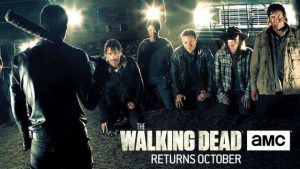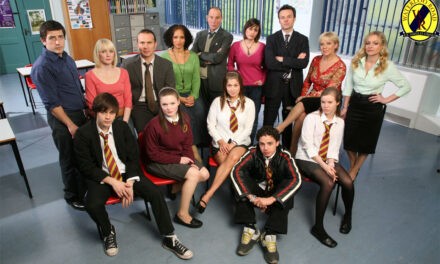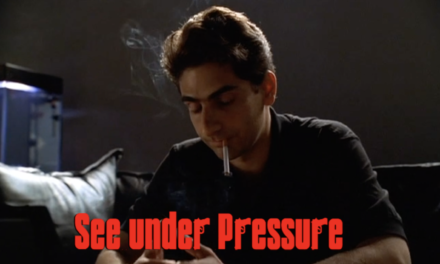There is a quote I have used in my first year Media Cultures course, when I address the opening topic ‘Why study the media?’ I cannot recall where I first read it but I have always attributed it to French cultural theorist Roland Barthes. But now I am troubled that I cannot find a source for his words of advice, To be a critic one also needs to be a fan. Perhaps he never wrote such words. Maybe someone else did. Perhaps it is the kind of thing I would have wanted him to say. Maybe I am just imagining it.
Given such doubts, I have gone for a substitute from a more verifiable and venerable source, Everything we hear is an opinion, not a fact. Everything we see is a perspective, not the truth (Marcus Arelius, 121-180 AD). In these days of the decline of the public discourse, and the proliferation of fake news, such an ancient caution seems more appropriate.
Nevertheless, exploring and accounting for fandom remains very central to what I do. I prefer to teach about media I like and hope to pass on some of my enthusiasms to my students, Of course, I continue to provide spaces for their media—and fandoms—even though I may have little to say that might be useful about the Kardashians or the latest Transformers movie.
Fortunately, there are many occasions when our tastes coincide. For example, in my second year Contemporary Television course this year, we discovered a shared interest in The Walking Dead (AMC), which provided an avenue towards a focus on high-end, long-form American television drama.

Submission to Negan: The Walking Dead Season 7
But I may not be able to do this in the 2017 iteration of this course for I have abandoned Rick and his clan to their fate. We have parted ways. The beating to death of Abraham and the murder of Glenn, by the very comic-book villain Negan, in the first episode of the current season (Season 7, overall episode 84) was the moment when I declared (out loud), “I can’t watch this anymore!”. I had previously given The Walking Dead one last chance back in Season 4, in wake of the brutal and completely unnecessary be-heading of Hershel Greene; a character who brought moments of humility and humanity to a chaotic world.
Of course we are talking about fictional worlds and fictional characters here. But we can argue that contemporary dramas such as The Walking Dead are less about fictionality, entertainment and diversion, and more about expressing cultural anxieties and a deep uneasiness amongst the populace., as in a typical claim from thecriticalzombie.wordpress.com ”We need something like the zombie. It can teach us so much about ourselves, or fears, what our society thinks we fear’.
Good drama always demands audience investment in character development and over seven seasons this has been a necessity for walking non-dead in The Walking Dead. The slobbering, drooling mass of zombies are devoid of any personality; the complex range of emotions and motivations (jealousy, betrayal, loyalty, love, brutality, empathy, hope, despair) are invested in the human characters. So, it hurts when a much-loved or morally-complex character is dispatched without warning or justification—and more hurtful when the crime is committed by human hands and not the clutching claws of a zombie.)
Some might argue that I am being a little precious or delicate, for The Walking Dead constructs a world where the rules of civility do not apply but where the conventions of horror fiction prevail, in a Hobbesian universe of survival-at-all-costs. Nevertheless, I would argue that in a world where disruption, fear and uncertainty seems the new norm–in the wake of Brexit, Trump and a renewed racism, the visible decline of democracy and global warming et al–we need a little more hope and a little more love and empathy.
I will miss The Walking Dead but I leave in sadness rather than in anger. Thankfully, there is plenty of good television available to fill the space.
Geoff Lealand is Associate Professor in Screen and Media Studies, University of Waikato, New Zealand, where he teaches and writes about world cinema, television, children and media, and media education. You can check out his current research activities HERE. A yet to be fulfilled ambition is to watch all episodes of The Wire. He has been writing various pieces based on his research on Shirley Temple ‘double’ contests held in New Zealand in the 1930s; most recently including these investigations of cultural memory and fandom into his contribution on the child star in the Routledge Companion to Global Popular Culture, edited by fellow-cst contributor Toby Miller.





I have had a similar response to this episode although for what feels like slightly different reasons. I found the graphic violence incredibly disturbing (even thinking of it now makes me feel literally sick to the stomach) and presented in ways that did nothing for the overall themes of the story, which are about how humanity (in both senses of the word) survives in a post-apocalyptic society. The problem with characters like Negan is that they are so one-dimensional – defined solely by aggression and the will to power. There is no nuance here, just brutality of the most disturbing kind enacted against characters that had become loved friends. Constructing simplistic human villains in this way doesn’t help The Walking Dead to really explore its central themes. It just perpetuates the idea that the only people in the fictional world who are treading the thin, thin line between humanity and brutality are the central characters. And, ultimately, I don’t want to spend time in a world that is so bleak, and so sickeningly, brutally lacking in humanity.
It seems like others may have similar reactions to season 7 of The Walking Dead. This from Slate : “The Walking Dead Is Getting Its Worst Ratings in Years. Blame Negan” http://www.slate.com/blogs/browbeat/2016/12/12/how_negan_killed_the_walking_dead_s_seventh_season.html